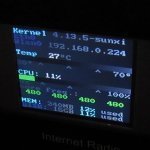-
Posts
116 -
Joined
-
Last visited
Content Type
Forums
Store
Crowdfunding
Applications
Events
Raffles
Community Map
Everything posted by raschid
-
@evilalex2 Try another build (after updating sources) - it should work now ...
-
@Igor: The source of the error is the XRADIO driver: scripts/Makefile.build:320: recipe for target 'drivers/net/wireless/xradio/ap.o' failed make[4]: *** [drivers/net/wireless/xradio/ap.o] Error 1 scripts/Makefile.build:579: recipe for target 'drivers/net/wireless/xradio' failed make[3]: *** [drivers/net/wireless/xradio] Error 2 make[3]: *** Waiting for unfinished jobs....
-
Same issue here - patching log attached. patching.log
-

NanoPi Duo OTG works with FriendlyElec image, but not Armbian (SOLVED)
raschid replied to sgjava's topic in Allwinner sunxi
Ideally adding this to the dts should do the trick: &usb_org { dr_mode = "host"; status = "okay"; }; Since my Duo is V1.0 I can't test though ... -
Just for the record: Yep, agree. I don't use NM on any of my boards. For me it is. For me it certainly was. I would second that. Nothing wrong with that. Peace!
-

How can I build EMMC boot armbian firmware for H2 board
raschid replied to timothyzhu's topic in Beginners
You build and install to SD and then transfer the installation to eMMC via armbian-config. -
That's a shame - and a lost opportunity. Thx for the info though ...
-

New OPi Zero - Yet another high temperature issue...
raschid replied to bozden's topic in Orange Pi Zero
This issue seems to specific to one specific revision of the Orange Pi Zero (Rev1.4). -
The idea is to install "linux-u-boot-next-sunvell-r69_5.37_armhf.deb" to emmc. Install via dpkg gives: Device /dev/mmcblk0 does not exist, skipping Yeah, nah, don't think I got that ... Could you a bit more specific?
-
Different box, similar issue: Device: Sunvell R69 OS: armbian 5.37 stretch 4.14.6 installed on eMMC via armbian-config test@sunvell:~/kernel-debs/video$ sudo dpkg -i linux-u-boot-next-sunvell-r69_5.37_armhf.deb (Reading database ... 55050 files and directories currently installed.) Preparing to unpack linux-u-boot-next-sunvell-r69_5.37_armhf.deb ... Unpacking linux-u-boot-sunvell-r69-next (5.37) over (5.37) ... Setting up linux-u-boot-sunvell-r69-next (5.37) ... Device /dev/mmcblk0 does not exist, skipping /dev/mmcblck0 indeed does not exist, one the SD-card is removed: test@sunvell:~/kernel-debs/video$ ll /dev/mm* brw-rw---- 1 root disk 179, 0 Dec 17 11:23 /dev/mmcblk1 brw-rw---- 1 root disk 179, 8 Dec 17 11:23 /dev/mmcblk1boot0 brw-rw---- 1 root disk 179, 16 Dec 17 11:23 /dev/mmcblk1boot1 brw-rw---- 1 root disk 179, 1 Dec 17 11:23 /dev/mmcblk1p1 So ... Any idea to solve this?
-
you don't need to apply the patch manually. This will do: ./compile BOARD=sunvell-r69
-
Try https://github.com/karabek/nanopi_duo_gpio_pyH3. I have not tried SPI, but I2C works rather nicely.
-
There is community support (sunvell_r69.csc) for a mainline kernel now, which provides access to the eMMC. No HDMI support yet though ...
-
There is no Device Tree for this device at this time - and without a dts you will not be able to build a mainline kernel with working wireless. But you can build a legacy kernel using a "community supported" board configuration ("sunvell-R69.csc"): ./compile.sh BOARD=sunvell-r69.csc You will find more on building armbian kernels here: https://docs.armbian.com/Developer-Guide_Build-Preparation/
-
### meminfo: MemTotal: 1024100 kB MemFree: 901772 kB This looks odd. AFAIK the OPi Zero only comes with 256M or 512M.
-
Maybe I need a bigger bread board ... testing I2C with a small OLED display with the current device tree patches ...
-
maybe "enabled" would have been a better term than "activated" ... "enabled" as in containing the following in the "sun8i-nanopi-duo" kernel-patch: + +&spi1 { + status = "okay"; + spidev1: spi@1 { + compatible = "nanopi,spidev"; + reg = <0>; + spi-max-frequency = <10000000>; + }; +};
-
Excellent stuff When using this image on a breadboard, keep in mind that here SPI is activated by default - so you should not use GPIOs A13-A16 for non-SPI stuff. There's an updated set of patches addressing this issues that hat not been merged yet: https://github.com/armbian/build/pull/816 Works.
-
Nice! Where would I find that blog?
-
@Igor Very small issue: The DUO is a H2+ device. Any specific reason why it is flagged a a H3 board on the armbian dowload page? People will not find it when they hit the <H2+> button on the download page ...
-
It is usbhost2. I don't have the shield, but I checked the USB ports on the DUO. No port 1 there ...
-
All pins of the DUO module are routed the the shield's GPIOs (or audio components), except for the tweo USB lines (2&3). So I guess one USB line feeds into a 4xhub for the shields USB ports and the other drives the mSATA converter.
-
@walt22/ @Larry Bankthere is a "community supported" armbian config for the NanoPi Duo now, supporting the Xradio WLAN chip - gives me 20-22Mbit/s over 1,5m. To build the kernel you have to specify the board in the compile command ("compile.sh BOARD=nanopi-duo") in the armbian dev environment.
-
Mainline linux uses a "device tree" data structure to represent specific properties of board hardware (such as wlan chips). Device tree files are usually part of the kernel building process - and at the moment there is no such file for the NanoPi Duo in the armbian kernel build environment (it would be called something like <sun8i-h2-plus-nanopi-duo.dts>). Alternatively there is a mechanism to adapt device tree entries for an existing kernel referred to as device tree overlays. An example for such an overlay explicitly for integrating an xradio wlan chip (for an orange pi zero) can be found at https://github.com/karabek/xradio/ (see file <xradio-mrk1.dts> in directory <dts>.
-
It should work - maybe there is a hardware issues with the expansion board (or your audio chain). I use a current 4.13.x kernel on an OpiZero - audio works fine.
